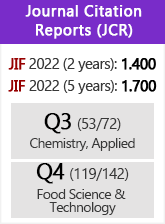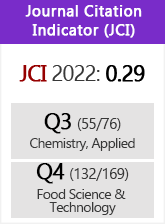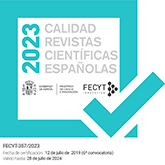Rancidity inhibition study in frozen whole mackerel (scomber scombrus) by a previous plant extract treatment.
DOI:
https://doi.org/10.3989/gya.2005.v56.i3.108Keywords:
Flaxseeds, Frozen storage, Mackerel, Quality, Rancidity, Whole pieceAbstract
The effect of flaxseeds (Linum usitatissimum) on rancidity development in frozen whole mackerel (Scomber scombrus) was studied. For it, fresh mackerel were dipped in flaxseeds aqueous extract during 60 min, frozen at –80 ºC during 24 hours and kept frozen (–20 ºC) up to 12 months. Sampling was carried out on the initial material and at months 1, 3, 5, 7, 9 and 12 of frozen storage at –20 ºC. A parallel experiment with non treated fish was carried out in the same conditions. Rancidity development was measured by several biochemical indices (free fatty acids, peroxides, conjugated dienes and trienes, secondary oxidation products and lipoxygenase activity) and complemented by the sensory analysis (skin, flesh odour, consistency and flesh appearance). As a result of the previous antioxidant treatment, peroxides showed to breakdown faster (p<0.05) after month 7, so that higher (p<0.05) contents on conjugated dienes and trienes could be detected in treated fish. The antioxidant treatment also led to some lower free fatty acid and secondary oxidation compounds formation. Lipoxygenase activity was lower (p<0.05) at month 1 in treated samples; this decreased activity had not consequences on primary lipid oxidation compound but agreed to results obtained on secondary oxidation when comparing both kinds of samples. In spite of these small differences obtained from the biochemical analyses between treated and untreated fish, the sensory assessment led to the same shelf-life time (5 months), although some performances on skin and flesh appearance could be outlined as a result of the antioxidant treatment. The present work provides a first attempt for applying an aqueous plant extract to a pelagic whole fish as a previous step to its commercialisation as a frozen product. Further research enabling a faster diffusion of antioxidant compounds to the fish muscle and employing synergic mixtures of antioxidant compounds is encountered to avoid quality loss and attain a larger shelf-life time during the frozen storag
Downloads
Download data is not yet available.
Downloads
Published
2005-09-30
How to Cite
1.
Stodolnik L, Stawicka A, Szczepanik G, Aubourg SP. Rancidity inhibition study in frozen whole mackerel (scomber scombrus) by a previous plant extract treatment. Grasas aceites [Internet]. 2005Sep.30 [cited 2024Apr.19];56(3):198-204. Available from: https://grasasyaceites.revistas.csic.es/index.php/grasasyaceites/article/view/108
Issue
Section
Research
License
Copyright (c) 2005 Consejo Superior de Investigaciones Científicas (CSIC)

This work is licensed under a Creative Commons Attribution 4.0 International License.
© CSIC. Manuscripts published in both the printed and online versions of this Journal are the property of Consejo Superior de Investigaciones Científicas, and quoting this source is a requirement for any partial or full reproduction.All contents of this electronic edition, except where otherwise noted, are distributed under a “Creative Commons Attribution 4.0 International” (CC BY 4.0) License. You may read here the basic information and the legal text of the license. The indication of the CC BY 4.0 License must be expressly stated in this way when necessary.
Self-archiving in repositories, personal webpages or similar, of any version other than the published by the Editor, is not allowed.
















